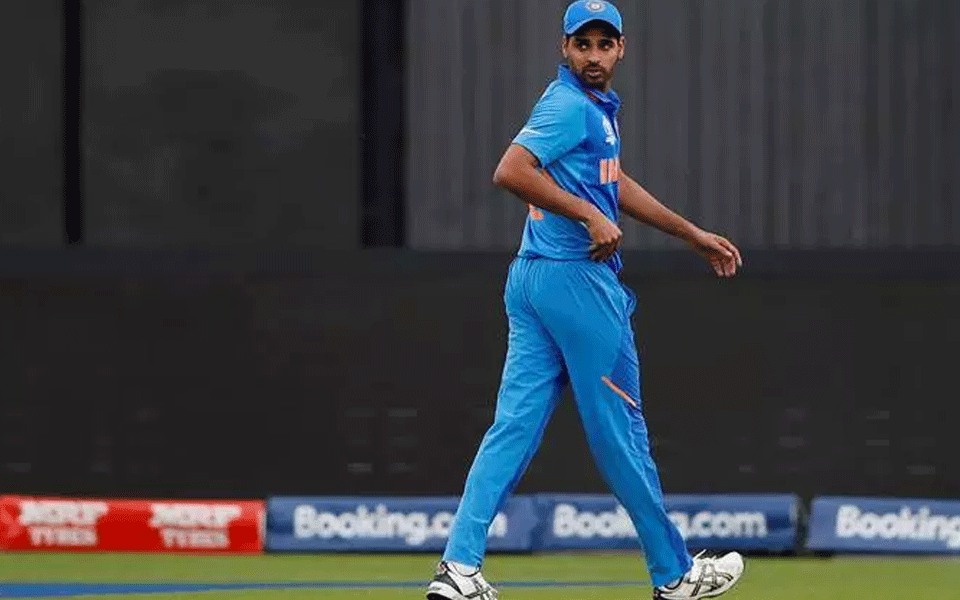Manchester: Pacer Bhuvneshwar Kumar was on Sunday ruled out of India's, at least, next two World Cup games after developing a niggle in his left hamstring during the clash against Pakistan.
The paceman walked off the field without completing his third over and India skipper Virat Kohli confirmed that he will be replaced by Mohammed Shami in the following games.
"Slight niggle for Bhuvi, he slipped on one of the footmarks. He's out for two, maybe three games, but he should come back for us at some stage during this tournament. He is very important for us," Kohli said at the post-match presentation ceremony after India thumped Pakistan by 89 runs.
Kohli added that "Shami was raring to go". India's next three games are against Afghanistan (June 22), West Indies (June 27) and England (June 30).
It is second big jolt for India as opener Shikhar Dhawan has already been ruled out of a few games due to a thumb injury, sustain during the match against Australia.
The India captain was effusive in his praise for team's top-order batsmen, especially Rohit Sharma, who struck his second hundred of the tourmament
"Rohit's knock was outstanding again. KL helped Rohit, who showed why he's such a good ODI player again today. It was a team effort to get to 336."
Kohli was also relieved that Kuldeep Yadav was back in form.
"Kuldeep Yadav was brilliant. Babar and Fakhar were trying to play him out, but I wanted him to have a longer spell. The ball to dismiss Babar was an outstanding delivery. I think today was the best he bowled at this World Cup."
Asked that India-Pakistan games have not lived up to hype of late, Kohli said they do not fall to the trap of playing to hype.
"I think they outplayed us in the Champions Trophy final (in 2017) but if you focus on this game as too emotional, things can go wrong. We never approach them from that perspective. We are professional about it and the result is what matters."
Let the Truth be known. If you read VB and like VB, please be a VB Supporter and Help us deliver the Truth to one and all.
Hyderabad (PTI): Telangana Chief Minister A Revanth Reddy met Union Home Minister Amit Shah in Delhi on Wednesday night and urged him to increase the sanctioned strength of IPS officers to the state in view of its growing administrative and security needs.
The two leaders also discussed the recent surrender of several senior Maoist leaders before the Telangana Police and other issues.
"During the meeting, the two leaders discussed the issue of Maoist surrenders and their rehabilitation. The chief minister informed Shah that significant improvements in policing have taken place in Telangana over the past two years," an official release here said.
Highlighting that 591 Maoists have laid down their arms and joined the mainstream of society during this period, the chief minister said the state government was providing them compensation and rehabilitation assistance as per the rules.
He requested the Union home minister to extend financial support from the central government for development works in the backward regions of the state.
Reddy also urged Shah to increase the sanctioned strength of IPS officers to the state from 83 to 105 in line with the state's growing administrative and security needs, the statement said.
The first cadre review after the formation of Telangana was conducted in 2016, while the next review, due in 2021, was delayed and finally carried out in 2025. Even then, only seven additional IPS officers were allocated to the state, the chief minister informed Shah and requested that the third cadre review be conducted in 2026 as per the schedule.
Reddy explained that Telangana, like the rest of the country, is facing several modern challenges, including cybercrime, drug trafficking, white-collar crimes, and other emerging security threats.
He highlighted the reorganisation of the Hyderabad, Cyberabad, and Malkajgiri Police Commissionerates, the proposed formation of the Future City Commissionerate and the rapidly growing population in Hyderabad to underline the increasing administrative requirements of the state.





